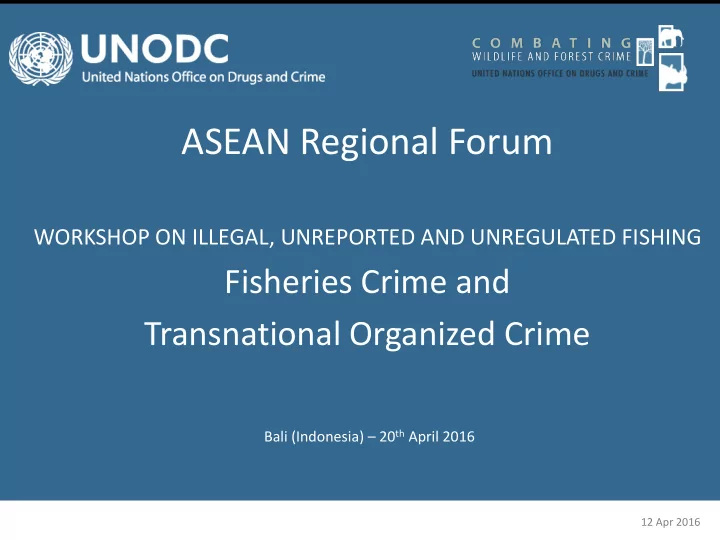

ASEAN Regional Forum WORKSHOP ON ILLEGAL, UNREPORTED AND UNREGULATED FISHING Fisheries Crime and Transnational Organized Crime Bali (Indonesia) – 20 th April 2016 12 Apr 2016
A multi-sectorial problem Environment Rule of Trade Law Fisheries Crimes
A multi-sectorial problem Environment Rule of Trade Law Fisheries Crimes
Non-traditional security threats • Fishing industry highly vulnerable to transnational organized crime • Human trafficking, such as forced and child labour • Key role of corruption to obtain rights, permits, licences, etc. • Fishing vessels are used for migrants smuggling, drug trafficking, acts of terrorism, traffic in weapons • Transnational organized crime groups involved in high value – low volume illegal harvesting of fish species
UN Framework on Transnational Organized Crime
Transnational Organized Crime • A structured group of three or more persons • Acting together with the aim of committing one or more serious crime • In order to obtain financial or material benefit • These crimes are planned and/or committed in more than one country Serious Crime : offence punishable by a maximum deprivation of liberty of at least 4 years or more
United Nations Convention Against TOC It is a global, flexible and practical legal instrument with the aim of promoting cooperation to prevent and combat transnational organized crime more effectively It has been adopted by 186 Member States of the United Nations. BRU CAM IND LAO MAL MYA PHI SIN THA VN
Criminalization in UNTOC • Convention requires States Parties to have four basic offences (Art 34.2): 1. Participation in an organized criminal group (Art. 5) 2. Laundering of proceeds of crime (Art. 6)* 3. Corruption (Art. 8)* 4. Obstruction of justice (Art. 23) • All of the above to be criminalized even if the offence is not Transnational and/or Organized (Art.34.2) (except art. 5) * Obligation to provide copy of the Law to the Secretary-General of the UN
Scope of application • It applies to the “prevention, investigation and prosecution” of • Offences established by the convention • Other serious crimes • Protocol offences • Only when: • transnational in nature • an organized criminal group is involved
Jurisdiction (Art. 15) • Mandatory/compulsory jurisdiction when: – offences are committed on a State’s territory, vessel or aircraft – where offender is not extradited because of nationality • Optional jurisdiction – Offender or victim are nationals of the State Even if the offence is – Stateless offender who resides in the State NOT committed – participating in organized criminal group with a view to in the committing serious crime in the State territory of the State – any other circumstances set by domestic law
UNODC / WWF Expert Group Meeting on Fisheries Crime DRAFT CONFERENCE ROOM PAPER FOR THE COMMISSION ON CRIME PREVENTION AND CRIMINAL JUSTICE, 2016
General premises to fisheries crimes • Looking at all serious offences within the fisheries resources sector, along the entire supply and value chain • Fisheries crime is not associated with fishing only Tax Human evasion trafficking Encroachment Documents fraud Money Conspiracy Corruption Illegal harvesting laundering of fish and marine resources Labour law Other forms violations Murder of TOC
Laws and policies • Review national legal framework to criminalize key offences related to fisheries crimes • Adopt commensurate penalties (e.g. 4 years threshold) • Useful to adopt US Lacey Act-like provisions* • Avoid disproportionate measures that would impact on small scale fishers * i.e. criminalizing the import, distribution, possession of natural resources captured against the domestic law of originating or exporting State
Jurisdiction • Exercise full range of national jurisdictions based on: – Nationality of human trafficking victims – Territory where the vessel operates – Residence of vessel beneficial owner – Country where corruption money originates or ends up to – Market/destination countries of illegally harvested resources
Law Enforcement tools • Greater exchange of information (i.e. vessels docs, log books, licensing, export/import, etc) • Use of existing platform, such as INTERPOL and WCO • Emphasis on financial and AML investigations • Use of UNTOC as basis for Mutual Legal Assistance and evidence exchange • Promotion of cross-disciplinary multi-agency task teams
Criminal investigations • Recognizing that administrative violations may be linked to broader criminal activities • It is important to combine the use of administrative laws (e.g. fishery laws) with a broad range of others laws: – Criminal codes – Tax legislations – Anti-corruption laws – Labor laws – Organized crime laws
Awareness raising and training • Need to raise awareness on the seriousness of fisheries crimes at political level and in international fora • Sensitize judges and prosecutors on the seriousness of the crime beyond administrative laws • Support investigative authorities (especially police) to make use of the “full range of the law”
Conclusions • The fishery resources sector is highly exposed to risks of Transnational Organize Crimes • The protection of this sector requires responses that transcend the mere use of administrative and regulatory instruments • A criminal justice based approach is necessary to combat forms of TOC within the fishery industry • A number of legal and policy reforms are necessary to mount effective response at national, regional and global level
Thank you for your attention! Jorge E. Rios Global Programme for Combating Wildlife and Forest Crime United Nations Office on Drugs and Crime Contact us: wlfc@unodc.org Visit our website : http://www.unodc.org/unodc/en/wildlife-and-forest-crime 5 May 2015
Recommend
More recommend